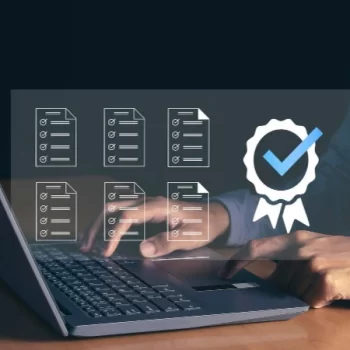Managing multiple vendors in an IT ecosystem can be daunting and fraught with risks. From the complexities of contract negotiations and renewals to the compliance challenges, the process is often time-consuming. In such a scenario, RMM Tools can help, a unified, scalable solution that can streamline various aspects of IT and network infrastructure, reducing the administrative burden and enhancing operational efficiency.
Rapid technology advancements and the growing interdependencies within IT infrastructures further amplify this need. A unified Remote Monitoring & Management (RMM) platform simplifies the management process while providing a comprehensive oversight of the IT landscape. It is important for preempting potential issues and ensuring smooth operation across different systems and vendors.
Related article: Can RMM be the game-changer in terms of boosting employee productivity?
Key Advantages of RMM Tools
- Centralized vendor management: RMM platforms offer a centralized system for managing multiple vendors, greatly simplifying the process of interaction and compliance. This centralization leads to a more streamlined approach to vendor management, reducing the administrative burden.
- Contract lifecycle supervision: RMM tools include comprehensive features to oversee vendor contracts from start to finish. This includes initiation, negotiation, monitoring of contract performance, and handling renewals or terminations, ensuring contract compliance.
- Scalable IT infrastructure management: These solutions are designed to grow with your IT infrastructure, providing scalability without adding complexity or administrative workload. This allows for the smooth expansion of IT operations as business needs evolve.
- Unified network oversight: RMM tools provide a complete and integrated view of network and IT systems. This unified monitoring ensures that all components of the IT infrastructure are functioning optimally and in sync.
- IT service standardization: RMM solutions help in standardizing IT processes and protocols across various services. This standardization ensures consistency in service delivery and reduces operational discrepancies, leading to better IT management.
Why IT Managers Play a Multifaceted Role in RMM Capabilities
- Planning: Assess the organization’s IT needs, identify areas that can benefit from RMM, and create a strategic plan for its implementation
- Vendor selection: Research and select the appropriate RMM solution and vendor, evaluating factors like features, scalability, cost, compatibility, etc.
- Deployment and integration: Oversee the deployment of RMM tools, ensuring they are integrated seamlessly into the existing IT environment
- Policy development: Create and enforce policies and procedures for using RMM with guidelines for monitoring, reporting, and incident response
- Training and development: Organize training programs for IT staff to ensure they are proficient in using RMM tools
- Monitoring and analysis: Regularly monitor RMM dashboards and reports to proactively identify issues, bottlenecks, or security threats
- Incident response: Lead the incident response efforts, coordinating with IT teams to resolve issues promptly and minimize downtime
- Budget management: Allocate resources, justify expenses, and ensure that RMM investments align with business objectives
RMM Services MSPS Offer to Fast-Growing Enterprises
Remote network and server monitoring

MSPs deploy sophisticated tools to continuously monitor networks and servers, ensuring stable operations. This includes real-time surveillance of system performance, traffic, and security alerts. Moreover, advanced diagnostic capabilities within these tools allow for the early detection of issues, which can be crucial in preventing prolonged service interruptions and maintaining network integrity.
In addition to preventative measures, MSPs offer detailed reporting and analysis on network and server health, providing invaluable insights into system performance and potential areas for improvement. This level of detailed monitoring is essential for IT managers to ensure optimal network and server operations, aligning with business objectives and technological advancements.
IT/non-IT asset management
End-to-end management of IT and non-IT assets by MSPs covers every aspect of their lifecycle. This service includes procurement, deployment, maintenance, and eventual disposal or recycling of assets. It ensures that all assets are accounted for, their usage is optimized, and they remain up-to-date and compliant with current standards.
Furthermore, MSPs utilize advanced tracking systems and inventory management tools to maintain an accurate and real-time overview of asset status. This information is vital for IT managers to make informed decisions regarding asset allocation, budgeting, and future procurement, thereby enhancing the overall strategic management of resources within the organization.
Remote desktop management
MSPs offer remote desktop management services equipped with prebuilt accelerators and templates, making the deployment and maintenance of remote desktop environments a lot smoother. These tools enable IT managers to manage and support remote workforces, ensuring that all employees have the necessary resources and access for their roles.
Additionally, these services include comprehensive security measures and user access controls to protect sensitive data and ensure compliance with data protection regulations. The ability to remotely manage desktop environments also allows IT managers to quickly respond to and resolve any issues, minimizing downtime and maintaining productivity.
Advanced data analytics
MSPs provide advanced data analytics services, transforming raw data into clear, actionable insights. These services include the analysis of network traffic, user behavior, system performance, and security threats. The resulting reports are crucial for IT managers to understand and optimize the IT environment, making strategic decisions to improve performance and security.
These analytics services also offer predictive capabilities, enabling IT managers to anticipate future trends and potential challenges. By harnessing the power of data, MSPs help organizations stay ahead of the curve, ensuring they are well-prepared to adapt to new technologies and evolving business needs.
For IT managers, RMM services offered by MSPs can be transformative, providing streamlined operations, improved performance, and enhanced scalability. Hence, it is important to understand the full extent of what these services can do. Please visit www.infraon.io to know more.
Related blog: Do you work as an MSP? Here’s why you should invest in an RMM solution.



















